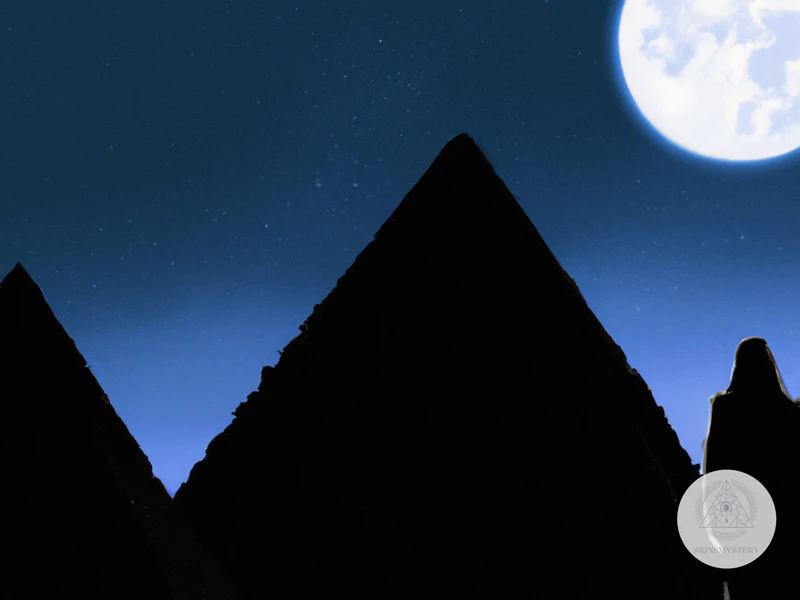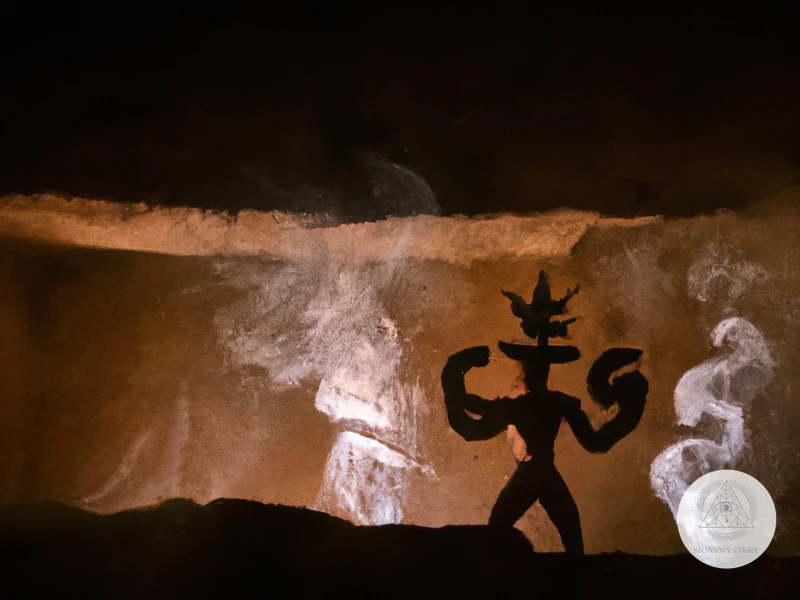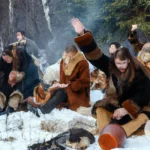As humanity evolved over time, ancient civilizations have been marked by unique beliefs, customs, and traditions. One of these intriguing practices is shamanism, a spiritual practice that has been passed down through generations and is still being practiced by some communities today. Shamanism is known for its close connection with the natural world and its belief of being able to communicate with spirits. In this article, we will delve into the role of shamanism in ancient civilizations such as Egypt, Greece, and Rome, exploring their fascinating practices and beliefs, and how they have left an imprint on human history.
Shamanism in Ancient Egypt

In Ancient Egypt, shamanism played a significant role in the religious practices and beliefs of the civilization. Shamans, known as “Wab”, were believed to have a direct connection to the spirit world and were able to communicate with the gods on behalf of their people. The Wab also played a vital role in embalming and mummification practices, as they were seen as the ones who could ritually purify and guide the deceased through the afterlife. Their use of music, dance, and ritualistic practices was an integral part of Egyptian shamanism, and their ability to heal both physical and spiritual ailments was highly valued. Although Egyptian shamanism differs from other shamanic traditions such as African, Siberian, and Native American shamanism, it is still considered to be one of the oldest and most powerful spiritual practices in human history.
The Role of Shamanism in Ancient Egyptian Religion
In ancient Egypt, shamanism played a significant role in religion. Shamans, known as “wab” in the Egyptian language, were considered to be powerful healers and intermediaries between the human world and the spirit realm. The Egyptians believed that everything was imbued with spiritual energy, and the shaman’s job was to harness this energy and use it to improve people’s lives.
One of the most prominent roles of shamans in ancient Egyptian religion was their ability to communicate with the dead. Egyptians believed that the dead had a profound impact on the living and that their spirits could be invoked for protection and guidance. As such, shamans were responsible for performing rituals that would allow them to connect with the spirits of the dead. One such ritual was the “Opening of the Mouth” ceremony, which involved the shaman using special tools to awaken the senses of the deceased and allow them to speak, eat, and drink in the afterlife.
Shamans in ancient Egypt also played a significant role in healing. They were often called upon to cure ailments that could not be explained by medicine or science. Shamans would use various techniques, such as chanting, drumming, and dancing, to enter a trance-like state and communicate with the spirit world. They believed that illnesses were caused by spiritual imbalances and that they could be cured by restoring harmony between the individual and the wider cosmos.
In addition to their healing abilities, shamans in ancient Egypt were also responsible for protecting their communities from negative energies and malevolent spirits. They believed that spirits could cause both physical and mental harm, and it was their job to protect people from these dangers. They would use magic spells and talismans to ward off evil spirits and protect their communities from harm.
Shamanism played a central role in ancient Egyptian religion. Shamans were viewed as intermediaries between the human and spirit worlds and were tasked with communicating with the dead, healing the sick, and protecting communities from negative energies and malevolent spirits. The Egyptians believed that spiritual energy imbued everything in the world, and shamans were essential in harnessing this energy for the betterment of their communities.
Practices and Beliefs of Ancient Egyptian Shamans
Ancient Egyptians believed that the human soul was made up of a number of different parts, including the ka, ba, and akh. The role of the shaman was to help guide these different parts of the soul through various realms of existence, both in life and in death.
To achieve this, shamans in Ancient Egypt would use a variety of tools, such as drums, rattles, and incense, to enter into a trance-like state. In this state, they could communicate with spirits and deities to gain knowledge and guidance.
One of the primary functions of Ancient Egyptian shamans was to perform divination. This involved interpreting various signs and symbols, such as the markings on the livers of sacrificed animals, to gain insights into the future. Shamans were also consulted for healing, either through the use of herbs and medicines or through invoking the help of deities.
Ancient Egyptian shamans believed in the existence of a vast network of spirits and deities, each with their own unique abilities and areas of influence. They believed that by calling upon these entities, they could harness their power to achieve both personal and communal goals.
Interestingly, while shamanism was a prominent aspect of Ancient Egyptian religion, it was not centralized in the same way that it was in some other cultures. Rather than a formal apprenticeship, shamans would often be self-taught or received guidance from established practitioners.
Internal Link: For a comparison of shamanic traditions in different cultures, check out our article on shamanic traditions comparison.
Shamanism in Ancient Greece
Shamanism in Ancient Greece had a significant impact on the religious beliefs and practices of the time. The ancient Greeks believed that shamans had the power to communicate with the gods and gain knowledge and insight into the workings of the universe. They were highly respected and sought after for their abilities to perform healings, divinations, and other spiritual practices. One well-known example of shamanism in ancient Greece is the myth of Orpheus, who was said to have traveled to the underworld to retrieve his wife. The practice of shamanism in ancient Greece also involved the use of various tools and techniques, such as the use of hallucinogens and the interpretation of dreams. It is believed that ancient Greek shamanism may have been influenced by shamanic practices in Central Asian, as well as by the traditions of nearby cultures such as Egyptian and Eastern Mediterranean societies.
The Role of Shamanism in Ancient Greek Religion
In ancient Greece, shamanism played a significant role in religious practices. Shamans, known as “shamans of the sun,” were believed to have direct communication with the gods. They acted as mediators between the gods and the people, interpreting omens and offering sacrifices on behalf of the community.
Orphism, a religious movement in ancient Greece, was heavily influenced by shamanic practices. Orphic initiates believed in the possibility of spiritual transformation and sought to purify their souls in order to achieve a higher state of being. This is evidenced by the Orphic Hymns, which contain language and imagery associated with shamanic ritual.
Divination, or the practice of seeking knowledge of the future or the unknown, was also a significant aspect of Greek shamanism. The Oracle of Delphi, one of the most famous divinatory centers in ancient Greece, was believed to be in direct communication with the god Apollo. The oracles, or priestesses, at Delphi would interpret the messages they received from Apollo and advise the people accordingly.
Another important aspect of Greek shamanism was the use of entheogens, or psychoactive substances, in religious ritual. The Eleusinian Mysteries, a series of religious rites celebrated in ancient Athens, were believed to involve the consumption of a potion containing a psychoactive plant or fungus. Scholars have suggested that this potion may have induced a shamanic “journey” or trance state in the participants, allowing them to experience spiritual revelations.
Mysteries cults were also popular in ancient Greece and often involved shamanic practices. These secretive religious groups focused on the worship of specific deities, such as Demeter or Dionysus, and often incorporated ritualistic drama and dance into their ceremonies.
In summation, shamanism played a vital role in ancient Greek religion, influencing everything from divination to mystery cults. Shamans acted as intermediaries between the gods and the people, while psychedelic substances were used to facilitate spiritual experiences. All of these practices contributed to a complex and rich religious tradition in ancient Greece.
Practices and Beliefs of Ancient Greek Shamans
Practices and beliefs of ancient Greek shamans were central to their religious practices and worldview. They believed that spiritual beings existed in all aspects of nature, including animals, plants, and even inanimate objects. Shamans played an important role in communicating with these spirits to seek their guidance and protection.
One common practice of ancient Greek shamans was the use of divination to communicate with spirits. They used various methods, such as interpreting dreams, reading omens, and casting lots, to gain insight into the future and seek guidance from the spirits. They also used different types of trance states, including drumming, dancing, and chanting, to enter a state of altered consciousness and communicate with the spirits.
In addition to divination and trance states, ancient Greek shamans also performed healing rituals. They believed that illness was caused by spiritual imbalances and that shamans had the power to restore harmony by communicating with the spirits and performing rituals to cleanse and purify the body and mind.
Ancient Greek shamans had a strong belief in the afterlife. They believed that the soul continued to exist after death and underwent a journey to the underworld, where it would be judged by the gods. They performed rituals and made offerings to ensure that the soul would have a safe journey and be accepted by the gods.
The practices and beliefs of ancient Greek shamans were closely tied to their religious worldview and played a crucial role in their society. While there are similarities with other shamanic traditions, such as, /central-asian-shamanism/, /japanese-shamanism-mythology/, and /australian-aboriginal-dreamtime-shamanism/, ancient Greek shamanism had its unique qualities that distinguished it from others.
Shamanism in Ancient Rome

Shamanism played a significant role in Ancient Rome, particularly in the community’s spiritual and religious practices. The belief in spirits and the ability of shamans to communicate with these spirits was one of the most critical aspects of Roman Shamanism. According to historical records, Roman shamans were believed to have the power to communicate with spirits and the supernatural world, interpret dreams, and see into the future. They were often called upon to heal the sick and perform rituals to ward off evil spirits. Despite being suppressed during the rise of Christianity, the influence of shamanism in Rome can still be seen in modern Western culture and spiritual practices.
The Role of Shamanism in Ancient Roman Religion
In ancient Rome, shamanism was not a central part of the official religion. However, it was present in various forms throughout Roman society. The role of shamanism in ancient Roman religion was primarily that of intermediary between the human and divine realms.
Roman shamanism was typically practiced by women known as “sibyls,” who were believed to possess the power of prophecy. They would enter into ecstatic trance
Subscribe to Our Newsletter
Sign up to receive the latest news and updates.
Another form of shamanism in ancient Rome was the cult of Cybele, also known as the Great Mother. This cult originated in Anatolia and was brought to Rome in the third century BC. It was centered around the worship of a goddess who was believed to possess the power of life and death. The cult’s rituals involved ecstatic dancing, drumming, and the sacrifice of animals.
Despite not being a part of the official Roman religion, shamanism still played an important role in ancient Roman society. The sibyls and the cult of Cybele provided a way for individuals to connect with the divine and seek guidance in their lives. They also served as a counterbalance to the more structured and organized aspects of Roman religion.
While shamanism was not a major part of ancient Roman religion, it still had an important role to play in the spiritual lives of the Roman people. The sibyls and the cult of Cybele provided a way for individuals to connect with the divine and seek guidance beyond the formal religious structures of Rome. Click here to learn about the impact of shamanism on Western culture.
Practices and Beliefs of Ancient Roman Shamans
Ancient Roman shamans, also known as ‘haruspices,’ were highly revered and played a significant role in the religious practices of the Roman Empire. The haruspices were skilled in divination and were responsible for reading natural signs and omens to interpret the will of the gods.
One of their most noteworthy practices was the examination of animal entrails, also known as hepatoscopy. They believed that the gods communicated with them through the appearance and position of the organs. This practice was highly ritualized, and only the haruspices were permitted to perform it.
Another practice that the Roman shamans believed was the use of amulets, charms, and talismans to ward off negative energy and evil spirits. They also believed in the power of prayer and incantations to combat malevolent forces.
The Roman shamans were also known to use different plants for medicinal purposes, as they believed that they had spiritual properties that could heal the body and mind. They used music and dance in their rituals to reach a heightened state of consciousness and connect with the divine.
The shamans were also skilled in dream interpretation and believed that the gods could communicate with them through their dreams. They encouraged individuals to keep a dream journal to help them understand the messages they received during sleep.
The ancient Roman shamans had a complex set of practices and beliefs that were deeply rooted in their religious traditions. They were highly respected members of society and had a significant impact on the lives of individuals who sought their guidance. Their use of divination, ritualized practices, and connection with the divine set them apart as powerful figures in the ancient world.
Impact of Shamanism in Ancient Civilizations
The impact of shamanism in ancient civilizations cannot be overstated. Shamans were highly respected members of society, serving as healers, spiritual guides, and intermediaries between the spiritual and physical worlds.
One of the most significant impacts of shamanism was the healing and curative practices that were developed. Shamans were able to use their spiritual powers to heal the sick and injured, often using herbs and other natural remedies to aid in the process.
In addition to healing, shamans played a crucial role in religious ceremonies and rituals. They acted as an intermediary between the physical and spiritual worlds, communicating with the gods and spirits on behalf of the people. The rituals performed by shamans were often complex and involved, with chants, dances, and other practices designed to connect with the spiritual realm.
Shamanism also had a significant impact on art and culture. Many ancient cultures developed their own unique styles of art and writing that were heavily influenced by their spiritual beliefs. For example, the intricate hieroglyphics of ancient Egypt were heavily influenced by the spiritual significance of certain symbols and glyphs.
Finally, the impact of shamanism can still be felt today, as many modern spiritual practices and belief systems draw heavily from these ancient traditions. Practices such as yoga, meditation, and acupuncture can all be traced back to the ancient beliefs and practices of shamans.
The impact of shamanism on ancient civilizations was profound, shaping the beliefs, culture, and practices of these societies in countless ways. Despite the passage of time, the legacy of shamanism continues to influence modern spirituality and remains an important part of our collective history.
Conclusion
In conclusion, shamanism played a significant role in the ancient civilizations of Egypt, Greece, and Rome. Ancient shamans were revered for their ability to communicate with the spiritual world and act as intermediaries between the physical and the spiritual realms. They were sought out for healing, divination, and cultural guidance. The practices and beliefs of shamans varied from culture to culture but their impact on the ancient civilizations cannot be overstated.
Shamanism remains a vital part of many cultures today and its influence continues to be felt. Modern-day shamans continue to be respected members of their communities and are sought out for their spiritual guidance and healing abilities. The legacy of ancient shamans has endured and their teachings continue to inspire seekers on their spiritual journey.
As we strive to understand our place in the universe, we must look to the wisdom and guidance of those who came before us. The ancient beliefs and practices of shamanism hold valuable lessons for all of us, and they continue to inspire and inform our understanding of the world around us. Let us honor the legacy of the ancient shamans and continue to learn from their wisdom and experience.
Frequently Asked Questions
What is shamanism?
Shamanism is an ancient spiritual practice that involves a practitioner, the shaman, who is able to enter alternate states of consciousness to communicate with the spirit world and engage with spiritual energies.
How did shamanism develop in ancient civilizations?
Shamanism was likely present in many ancient civilizations as a part of their spiritual practices. Over time, shamanism may have become integrated into more organized and formal religions.
What was the role of shamans in ancient Egypt?
Shamans in ancient Egypt played a significant role in guiding the dead through the afterlife, using various charms and spells. They were also a key part of healing rituals and were believed to have the ability to communicate with the gods.
What were the beliefs of ancient Egyptian shamans?
Ancient Egyptian shamans believed in a wide range of gods and goddesses, as well as a complex system of magic. They also believed in the concept of an afterlife and the importance of proper burial practices.
How did shamanism impact ancient Greek religion?
Shamanism in ancient Greece was believed to have influenced many aspects of the religion, including the use of divination and the importance of oracles. Greek shamans, known as “psychagogoi,” were thought to have a direct link to the divine and were highly respected.
What were the practices of ancient Greek shamans?
Ancient Greek shamans engaged in a variety of practices, including divination, healing, and communicating with spirits. They often used trance states to connect with the spirit world and were known for their ability to prophesize.
What was the role of shamans in ancient Rome?
Shamans in ancient Rome were known as “haruspices” and were responsible for interpreting the will of the gods through examining the entrails of sacrificed animals. They were also involved in divination and were thought to have the ability to communicate with the dead.
What were the beliefs of ancient Roman shamans?
Ancient Roman shamans believed in a complex pantheon of gods and goddesses, as well as the importance of ritual and sacrifice. They also believed in the concept of an afterlife and the necessity of proper burial practices.
How did shamanism impact ancient civilizations overall?
Shamanism had a significant impact on ancient civilizations, influencing many aspects of their spiritual and cultural practices. It allowed for personal connections with the divine, as well as the ability to access the spirit world for guidance and healing.
Is shamanism still practiced today?
Yes, shamanism is still practiced in many cultures around the world, including in parts of Asia, South America, and Africa. It has also gained popularity in the West as a form of alternative spirituality.










